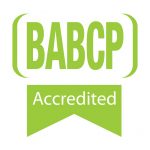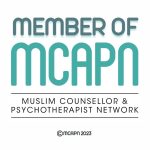About me
Muslim Counsellor and CBT Therapist
Dr. Azra Nanjiani MBBS BABCP Accredited
Welcome to Zamzam Counselling and CBT! I am Azra, a Muslim counsellor and a CBT therapist offering women a therapy option that integrates Islamic values with evidence based therapeutic approaches. I have been working as a psychotherapist with women worldwide since 2013.
Qualifications and Training
Dual Qualification in Psychotherapy
I am qualified in Counselling as well as Cognitive Behavioural Therapy (CBT) at a Postgraduate level. Together, both these trainings have given me the clinical skills and knowledge to offer much more to my clients than I could have with either of them. They both have a lot to offer and one may be more suited than the other depending on the client and their presenting problems.
Further details and follow up training in different approaches & clinical presentations
Medicine (MBBS)
BACP Accredited Postgraduate Diploma in Counselling and Psychotherapy
BABCP Accredited Postgraduate Diploma in Cognitive Behavioural Therapy (CBT)
CBT is based on an underlying rationale that our feelings and behaviours are largely determined by the way we view ourselves, others and the world. Thinking is based on attitudes or assumptions developed from earlier life experiences. CBT helps us understand and then gradually change unhelpful thinking and behavioural patterns that maintain our problems.
Focused Acceptance & Commitment Therapy (FACT) training
This was an advanced level training by Dr Russ Harris on delivering brief interventions using an Acceptance & Commitment Therapy (ACT) approach.
The aim of ACT is to maximize human potential for a rich and meaningful life, while effectively handling the pain that inevitably goes with it.
Attachment Narrative Therapy (ANT) training
(Bowlby Centre)
ANT focuses on family relationships, feelings and attachments. This training was facilitated by Rudi Dollis and Arlene Vetere who are pioneers of ANT.
Dialectical Behavioural Therapy (DBT) Skills training
Online training course designed and presented by Dr Marsha Linehan covering in-depth knowledge of the four DBT Skills of Mindfulness, Emotion Regulation, Interpersonal Skills and Distress Tolerance
CBT for Severe and Complex Depression
Training by Professor Stirling Moorey, renowned authority on Depression treatment
CBT for Obsessive Compulsive Disorder (OCD): CBT Strategies for Harm Focused & Complex OCD (BPS Approved)
Working with PTSD using Trauma-Focused CBT (BPS Approved)
CBT for Eating Disorders
Therapeutic Work with Teenagers (Centre for Child Mental Health)
Working with Phobias (BPS Approved)
Adapting CBT for Autistic people (BABCP)
CBT for Adults with ADHD (BABCP)
Evidence Based Psychological Interventions for Long-Term Health Conditions (LTC)
This training focused on anxiety and depression caused by living with long term health problems and the impact of anxiety and depression on people’s ability to manage their health problems.
Islamic Studies: Theology, Ethics, Arabic, Hadith Studies, Quranic Sciences, History and Fiqh (2003 to 2011)
Experience
I have worked as a Counsellor/Psychotherapist with people from a variety of backgrounds, faiths and cultures, ranging from age 4 to 84 since 2011. I now work as a Cognitive Behavioural Therapist mainly with adults.
While working for educational and charity organisations, the NHS and my private practice, I had a variety of experience working with anxiety, depression, relationship difficulties, trauma and other distressing problems.
I have worked as a therapist at:
Zamzam Muslim Counselling (My private practice)
Talk Wandsworth (South West London and St George’s Mental Health NHS Trust)
Brent Bereavement Services
SOAS Student Services (University of London)
Kids Company
Secondary school (London)
As a doctor I have worked at:
Civil Hospital Karachi
My first degree was in Medicine. It gave me an opportunity to experience working in a hospital that covered a socio-economically deprived population. This also included work in paediatrics where I could see and feel the anxiety and worry of parents for their children. In adult wards, I saw patients and their families during stressful times of their lives. Years of daily contact with patients struggling with different life challenges, medical and non-medical, gave me the opportunity to interact with them holistically on a personal and professional level. This really helped me to see and understand people within their social context. I also began to understand them better, as unique individuals with unique circumstances, beyond their presenting problems. This has positively impacted on how I relate to my clients now in my practice as a psychotherapist.
My experiences with patients, followed by my observations of human thinking and behaviour when raising my four children, contributed to my interest in psychology. It struck me how small positive experiences or changes can make a big positive impact on thinking and behaviours. I was interested in looking at humans beyond the physical (medical) problems. This eventually propelled me to move on to a career in psychotherapy, where I feel I can really make a difference to people’s lives with the help of God!
Membership and Registration
Private Heath Insurance Companies
I am a recognised provider with several insurance companies.
My Practice Goals
In addition to helping clients overcome their problems and reclaim their life back, I also focus on equipping and inspiring them to live to their maximum potential in order to achieve the best in both worlds.
By the end of our work, I like my clients to be able to:
-
See that therapy has made a big difference to their lives by helping them deal with their problems and that they had the strengths required to do so.
-
Feel confident and better equipped to deal with any future challenges they may face in life.
-
Continue the journey they started during therapy in terms of taking steps to make life more meaningful and fulfilling, living like the sort of person they want to be and building the life they want to live.
-
Live in a way that positively impacts and inspires others too.
-
Feel a stronger connection with God.

